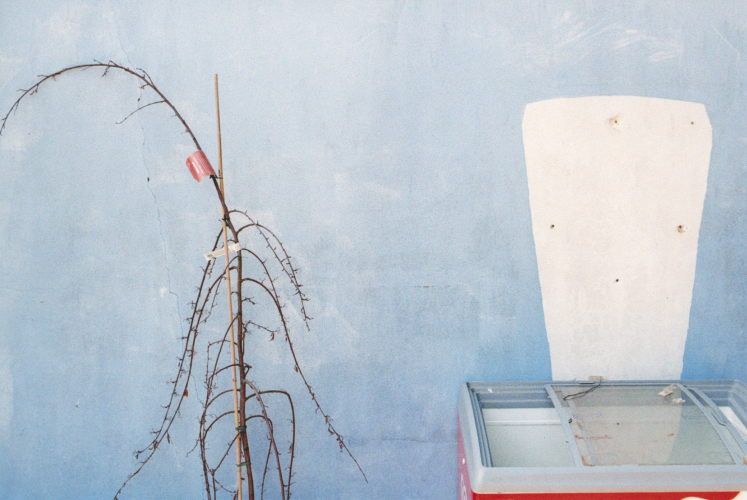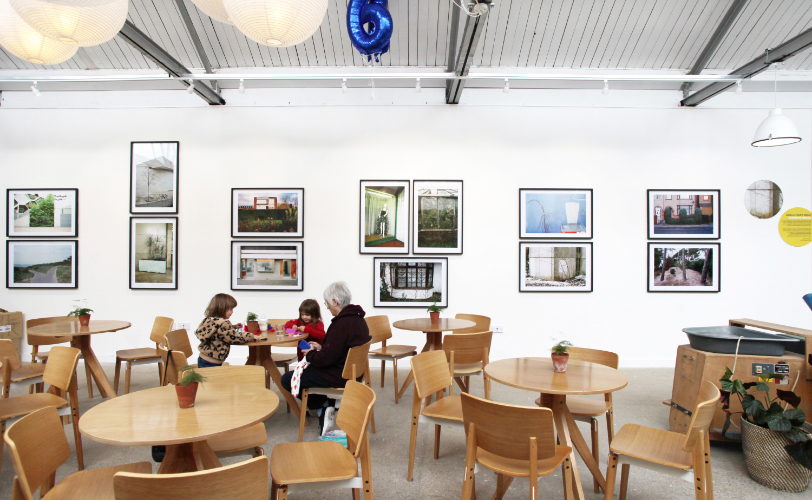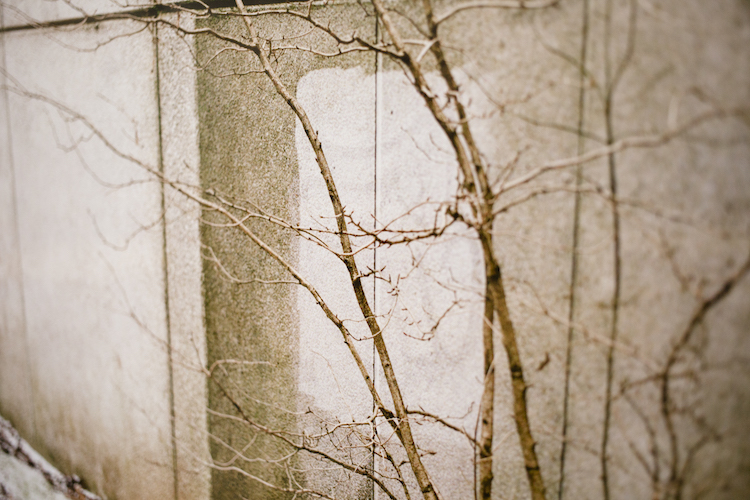13 Prints 36×24
July – September 2021
Commonground, Unit 5 – Fargo Village, Far Gosford St, Coventry CV1 5ED
Promotional film & install images by Paul Daly
This tightly curated collection was a micro-respective of works created over three years, between 2018 and 2021. The defiant idiosyncrasy of plants act as a focal point to this series created primarily in urban, suburban and other human-designed sites across the UK. Central to the work is a careful yet playful pursuit of elusive, quiet and peculiar moments of compositional balance and form, celebrating colour, texture and light. Responding to the landscapes that surround me at any given time, working intuitively and economically with what is there, and the same 35mm camera I have used for 17 years.
The title’s ’13 Prints’ is reference to an earlier solo show which took place at Class Room gallery in 2018: ’13 Prints 6×4′.
Commonground is a multi purpose art space, bar and cafe in Coventry who invited me to exhibit works for the opening of their venue. The selected images were co-curated with Kate Rossin, artist and co-director of Commonground.




Adele Mary Reed: within the four walls of the photograph’s frame?
by Anneka French
The cool damp earth lowers my pulse and I hear the robin call at the sight of the weeds. The small child inside me settles down. Gardening is all about placing faith in the future; you plant out tiny seedlings, remove weeds, nurture and tend. Planting things you may never even see grow big in your lifetime. It is not hope that drives this gesture … it might be something much older, something hidden in our DNA. Anyway the joy of it all is that it happens as long as we keep spinning round that great star. 1
These observations, made by writer and horticulturalist Alys Fowler, embrace headlong the power and the pleasure which can often be found in our immediate environment. These are simple, everyday, sometimes small or strange discoveries that are ripe for the picking. They serve to root us within place and to nourish us.
Adele Mary Reed shares something of this sensibility, as an artist who obsessively chronicles the things around her through photography. Naturally, impulsively, Reed feels that this is the best way to understand the world and her own place within it. ‘Everything seems more solid and secure when I can capture it within the four walls of the photograph’s frame’ Reed tells me when we meet to discuss her new exhibition at Coventry-based multi-purpose arts space Commonground. ‘That’s mine’ she says. ‘The photographs are my claim and my stake in the world’. Reed’s camera lens is her way of planting for the future, in nutrient-rich channels made by photographers and creatives that have gone before her.
The exhibition 13 Prints 36×24 displays thirteen photographs selected from thousands taken over the last three years, many shot within Reed’s native Coventry while on foot. The exhibition’s thematic thread is plant life as it co-habits with architectural structures in a variety of unexpected, fractionally off-kilter ways, a concept put forward by Commonground co-director Kate Rossin. The photographs were printed and framed on site at Commonground and the long-term support of Rossin has been critical to the development and promotion of Reed’s work. The exhibition is curated via echoed forms in paired relationships with the exception of one triptych. Depicting urban, suburban and one explicitly rural location, some of the photographs were made during and in between the Covid-19 pandemic lockdowns of 2020-21, at a time when the act of walking has been publicly emphasised as playing a crucial role within both our mental and physical health. This practice has been well-trodden, used and loved by Reed for years, however, as a way of looking – searching both inwards and outwards. The photographs are a slow, low-fi documenting and mapping methodology – an analogue Google Map unique to the paths Reed takes (or makes). Reed explains to me that the limitations of analogue film are key to her working process – indeed she has used the same 35mm camera for 17 years.
Reed’s walks made are creatively generative. In her memoir Flâneuse the New York born writer Lauren Elkin describes her own intensive walking practice as a way to attune to the streets. Elkin’s walks are, like Reed’s, a way of observing and reclaiming space through bodily experience and a way of starting conversations. How is public space designed and subsequently shaped by those that occupy it? What draws us to places, objects, viewpoints? Elkin offers one answer: ‘We all have our own signals we’re listening for or trying not to hear’.2 Reed’s work offers others.
As we talk in front of her work at Commonground Reed kindly dandles my youngest son on her knee while I sip coffee and make notes. Her little girl plays contentedly with a pink plastic toy camera at our table, evidently following her mother’s suit. Reed’s photographs are as generous as her nature – microcosmic invitations to explore the meaning of place with fresh eyes. In her photographs we find, for instance, trees bursting between the edges of two geometric buildings, barely contained; a choice between two pathways – the sea or the woods and the only photograph on display with a visible horizon; a lonely-looking potted palm in a dark, underground tube station, its triangular pot gently corroding where it meets the ground; a garden hedge clipped harshly into three phallic forms. Nearby we find weeds that fringe the frontage of run-down modernist architecture; a stuffed-to-burst greenhouse, with leaves pressed up against the glass; a limp sapling with an empty ice cream chest freezer for company. Perhaps strangest of all is a featureless mannequin in a window wearing a dress made from the snow-tipped branches of an artificial Christmas tree.
Aside from the mannequin and one distorted outline visible through a patterned glass window, Reed’s photographs are notable for their lack of people. While this, combined with the choice of overtly manicured or neglected sites lends the work a somewhat dystopian feel, there is something further taking place – a search for solitude that speaks not only to the obvious social restrictions of the pandemic but to a personal search for quiet, balance, self. Plants are only one subject within this body of work and they are resilient, defiantly standing, growing and asserting themselves upon place. Reed’s photographs are like treasures collected in the pocket of a child – curious, poignant, significant, precious – all connected by a distinct internal logic and an appetite for learning.
1. Alys Fowler, Letter: 4/6, From: Alys Fowler, Date: Tuesday 21 April, Time: 4pm, Weather: Sunny, Subject: A daily routine: a walk to feed the chickens. Extract from Six Lockdown Walks letter series with artist John Newling, commissioned by Ikon, 2020
2. Lauren Elkin, Flâneuse: Women Walk the City in Paris, New York, Tokyo, Venice and London, London: Vintage Publishing, 2017